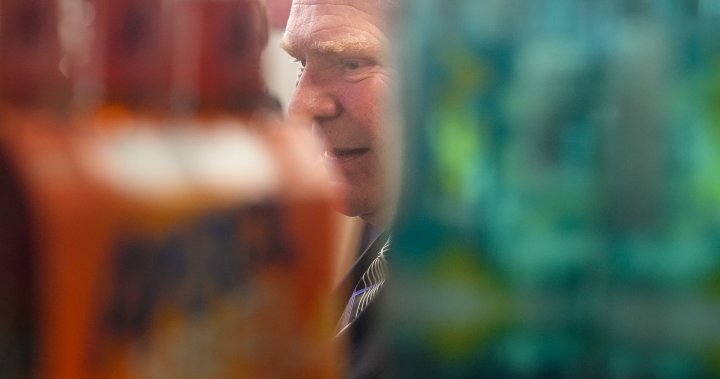Doug Ford’s recent order to the LCBO that it should clear U.S. booze from its shelves if Donald Trump imposes sweeping tariffs won’t hurt Ontario’s convenience stores, an industry group says.
The Convenience Industry Council of Canada, which represents 7,500 retailers in Ontario, told Global News in a statement that corner stores are well-equipped should the province retaliate against the U.S. president.
Last year, the province liberalized the sale of alcohol in Ontario, allowing convenience, grocery and big box stores to compete with the Beer Store and LCBO. However, when it did so, the province overhauled its wholesale and delivery network and made the LCBO the exclusive wholesaler for the entire province.
“Ontario’s convenience stores offer a broad enough assortment, including local products, that we are confident that we can continue to meet our customers’ needs and provide them with the choice and convenience they rely on us for,” said Anne Kothawala, the council’s president and CEO.
“Since convenience stores do not sell spirits, which account for a bigger percentage of U.S. alcohol, the impact on our stores will not be as significant.”

Ontario’s premier said Monday that he would order the LCBO, which is one of the biggest purchasers of alcohol in the world, to clear its shelves of U.S. booze and further promote Ontario-made wines and spirits in the event Trump follows through on his threat.

Get daily National news
Get the day’s top news, political, economic, and current affairs headlines, delivered to your inbox once a day.
Trump has threatened a 25 per cent tariff on all Canadian and Mexican exports, stemming from his demand the two allies tighten border security. He said he would impose them through an executive order on his first day in office.
Instead, he issued a broad trade memo to review trade relations, only to say late Monday that he thinks he’ll impose the tariffs anyway on Feb. 1.
Ottawa and the provinces have prepared retaliatory measures if those tariffs come. Global News reported last month that among those, the LCBO would be restricted from buying American products.

Gary Sands, senior vice-president of the Canadian Federation of Independent Grocers, echoed Kothawala’s remarks in an email to Global News.
“I don’t think it would be a huge issue for independents though. They are huge supporters of buying local and differentiating themselves from chains,” Sands said.
“So, they usually want to sell more local, Ontario or Canadian product. That being said, there would still be a plethora of offerings from other jurisdictions—South America, Europe and Australia.”
However, Sands said the province should use this opportunity to reassess its alcohol modernization plan, saying its requirement for grocers to accept empties is hampering more independent stores from participating.
Kothawala said the province has the convenience industry’s backing.
“The convenience industry supports the Ontario government’s efforts to defend against potential negative economic impacts on retailers, producers, and consumers,” Kothawala said.

Ford has said a 25 per cent tariff on Canadian goods could cost 450,000 to 500,000 jobs in that province, depending on which sectors are targeted.
That could mean the provincial government will need to spend billions to stimulate the economy, a decision Ford said he could try and frame an election around.
In fact, Ford said Friday he would be calling an early election Wednesday.
“We need a mandate from the people to fight against Donald Trump’s tariffs,” he said.
“The attack is coming against our families, our businesses, our communities, and with a strong mandate, we will be able to fight with Donald Trump to make sure we stop the tariffs and make sure that we give certainty to the people of Ontario.”
— with files from Isaac Callan and Colin D’Mello






